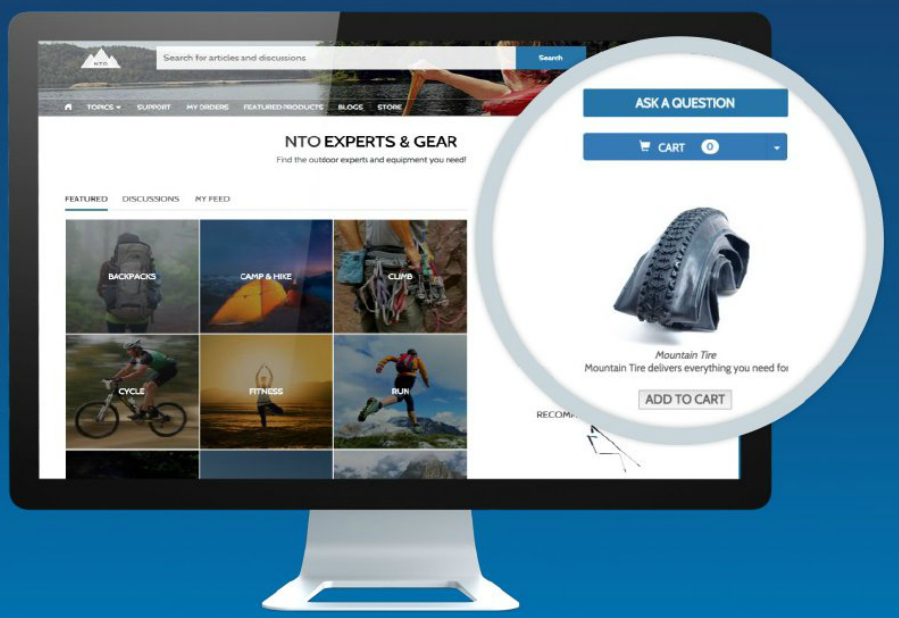Salesforce Evolves Communities From Forums To E-Commerce
Today Salesforce launched the ability to embed a Buy Button into sites built upon their Community Cloud platform. This new feature will bring the power of commerce to the world of social: enabling brands to leverage the activity that takes place in social channels and convert it into financial transactions. The following is Constellation Research’s reaction to the news, co-authored by Principal Analysts Alan Lepofsky and Guy Courtin.
Below you can see an example, in this case labeled Cart, which allows community members to add an item for purchase.

Shopping Meets Social
From the press release: "The new e-commerce capabilities enable communities of customers to discover, research, discuss and buy products in a single location while introducing a new sales channel for companies."
Alan's POV: This is significant because it enables companies to blend together 1) their community forums; where current and future customers can ask questions, post reviews and share feedback with 2) their e-commerce platform for purchasing. Today many companies separate these two functions, relying heavily on popular social media sites such as Facebook, Twitter and Pinterest for customer engagement, then shifting those customers to another location for purchasing transactions. The integration of community (social) and commerce (shopping) will allow for a much more seamless, hence more desirable customer experience.
Guy’s POV: Retail and CPG have long been aware of the growing power and influence social channels have on their brands and products. One only had to look as far as Twitter to see how brands such as @BestBuy or @USAir are acutely aware of any possible issue voiced by their customers. This announcement is looking to take advantage of the positive that comes of out social media – converting sales. Retail and CPG are also both acutely aware that their best sales people are existing customers. Enabling transactions to take place in these forums builds on the aspect of community influence.
Commerce Without Coding
From the press release: "With new e-commerce Lightning Components from Salesforce partners like CloudCraze, Demandware and Bigcommerce, companies will be able to seamlessly incorporate e-commerce into their communities. Lightning Components are reusable building blocks that enable companies to quickly add rich new capabilities into their communities without programming."
Alan's POV: While the idea of making it easy for "citizen developers" (line of business workers who are not trained coders) to simply drag and drop components into applications sounds appealing, organizations need to be weary, as there is more to application development than just writing lines of code. Successful applications rely on compelling user interfaces (the look) and user experiences (the interactions). Commerce is a complicated process, involving complex workflows between inventory, purchasing and shipping. These things require professionals with training and experience. That said, there is nothing wrong with Salesforce making it easier for professional developers to add these new e-commerce functions to their applications. The addition of the Buy Button and other components from their business partner eco-system, help make the Salesforce1 a compelling platform.
Complexity Of Supply Chain Meets Ease Of One Click Commerce
From the press release: “Community Cloud customers are already deploying custom e-commerce solutions, demonstrating the power of combining transactions with communities.â€
Guy’s POV: The addition of a transaction function to the communities is not as simple as adding some code to a web site. The supply chain aspects of order management, fulfillment and payment are all aspects of the supply chain that have to be in sync for the promise of a “buy†button to come to fruition. This is no simple task; many e-Commerce players have failed at this step. It will be an interesting play for the software giant if it can integrate some of the efforts it is making with Salesforce retail as well as the partnerships it announced to truly take this to then next level. As the examples given for this new offering revolve around digital assets, the challenge of moving physical goods is much more complex.
Summary: From Forums To E-Commerce
The announcement hold much promise when it comes to the integration of retail and communities. The addition of e-commerce provides Salesforce an edge over many rival social community platforms. However there remains much to be seen as to how Salesforce can fulfill some of the promises, especially when it comes to moving physical goods. What will they build themselves, what will customers need to build and what gaps will be filled by business partners and 3rd party vendors? Constellation supports this first step in integrating shopping and social and recommends customers speak with Salesforce to see if it will work with their specific e-commerce systems and suppliers. This is a space to watch, hopefully with more details and examples being presented at Dreamforce.


